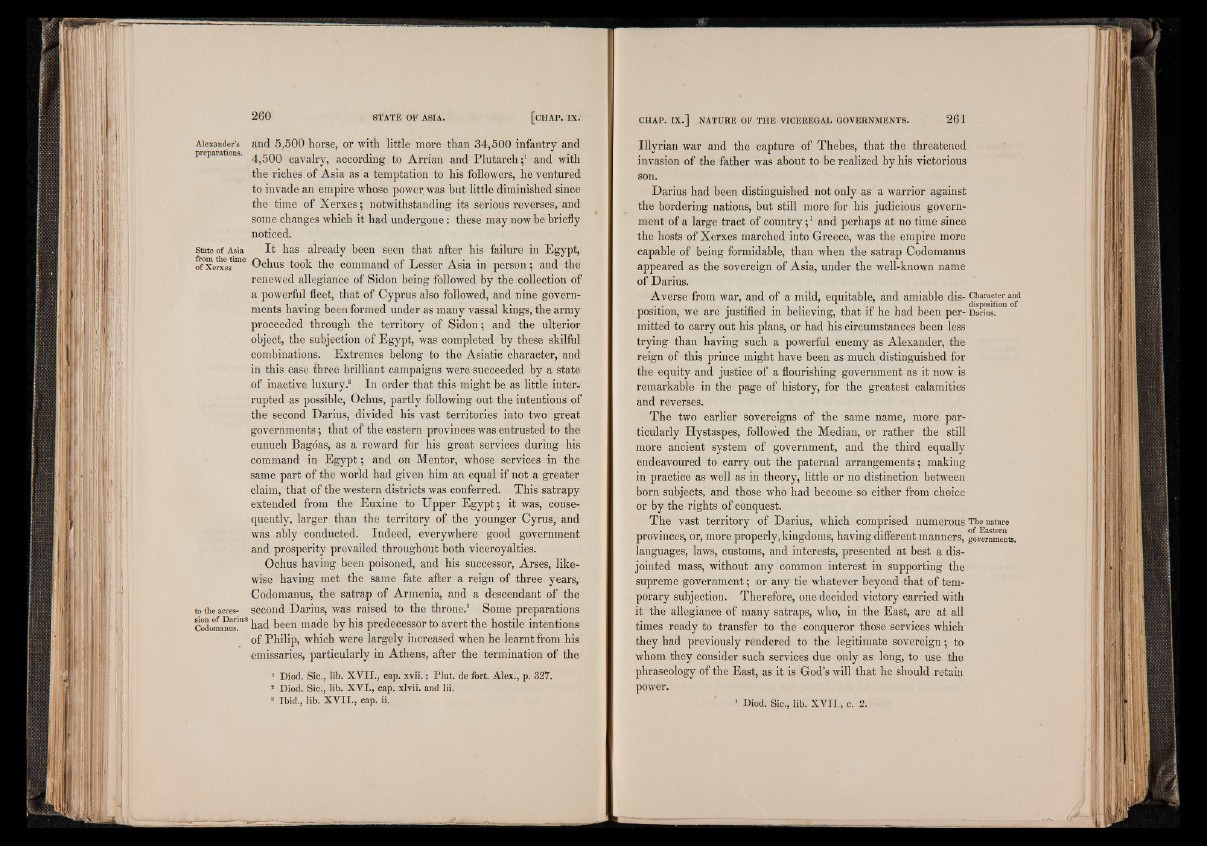
Alexander’s
preparations.
State of Asia
from the time
of Xerxes
to the accession
of Darins
Codomanus.
and 5.500 horse, or with little more than 34,500 infantry and
4,500 cavalry, according to Arrian and Plutarch;1 and with
the riches of Asia as a temptation to his followers, he ventured
to invade an empire whose power was but little diminished since
the time of Xerxes; notwithstanding its serious reverses, and
some changes which it had undergone: these may now be briefly
noticed.
It has already been seen that after his failure in Egypt,
Ochus took the command of Lesser Asia in person; and the
renewed allegiance of Sidon being followed by the collection of
a powerful fleet, that of Cyprus also followed, and nine governments
having been formed under as many vassal kings, the army
proceeded through the territory of Sidon; and the ulterior
object, the subjection of Egypt, was completed by these skilful
combinations. Extremes belong to the Asiatic character, and
in this case three brilliant campaigns were succeeded by a state
of inactive luxury.2 In order that this might be as little interrupted
as possible, Ochus, partly following out the intentions of
the second Darius, divided his vast territories into two great
governments; that of the eastern provinces was entrusted to the
eunuch Bagoas, as a reward for his great services during his
command in Egypt; and on Mentor, whose services in the
same part of the world had given him an equal if not a greater
claim, that of the western districts was conferred. This satrapy
extended from the Euxine to Upper Egypt; it was, consequently,
larger than the territory of the younger Cyrus, and
was ably conducted. Indeed, everywhere good government
and prosperity prevailed throughout both viceroyalties.
Ochus having been poisoned, and his successor, Arses, likewise
having met the same fate after a reign of three years,
Codomanus, the satrap of Armenia, and a descendant of the
second Darius, was raised to the throne.3 Some preparations
had been made by his predecessor to avert the hostile intentions
of Philip, which were largely increased when he learnt from his
emissaries, particularly in Athens, after the termination of the
1 Diod. Sic., lib. X V I I ., cap. x v ii.; Plut. de fort. Alex., p. 327.
2 Diod. Sic., lib. X V I., cap. xlvii. and lii.
3 Ibid., lib. X V I I ., cap. ii.
Illyrian war and the capture of Thebes, that the threatened
invasion of the father was about to be realized by his victorious
son.
Darius had been distinguished not only as a warrior against
the bordering nations, but still more for his judicious government
of a large tract of country;[ and perhaps at no time since
the hosts of Xerxes marched into Greece, was the empire more
capable of being formidable, than when the satrap Codomanus
appeared as the sovereign of Asia, under the well-known name
of Darius.
Averse from war, and of a mild, equitable, and amiable dis- Character and
. . . . n , . , , . . . . „ . disposition of position, we are justified m believing, that it he had been per- Darius,
mitted to carry out his plans, or had his circumstances been less
trying than having such a powerful enemy as Alexander, the
reign of this prince might have been as much distinguished for
the equity and justice of a flourishing government as it now is
remarkable in the page of history, for the greatest calamities
and reverses.
The two earlier sovereigns of the same name, more particularly
Hystaspes, followed the Median, or rather the still
more ancient system of government, and the third equally
endeavoured to carry out the paternal arrangements; making
in practice as well as in theory, little or no distinction between
born subjects, and those who had become so either from choice
or by the rights of conquest.
The vast territory of Darius, which comprised numerous The nature
provinces, or, more properly, kingdoms, having different manners, governments,
languages, laws, customs, and interests, presented at best a disjointed
mass, without any common interest in supporting the
supreme government; or any tie whatever beyond that of temporary
subjection. Therefore, one decided victory carried with
it the allegiance of many satraps, who, in the East, are at all
times ready to transfer to the conqueror those services which
they had previously rendered to the legitimate sovereign; to
whom they consider such services due only as long, to use the
phraseology of the East, as it is God’s will that he should retain
power.
1 Diod. Sie., lib. X V I I , c. 2.